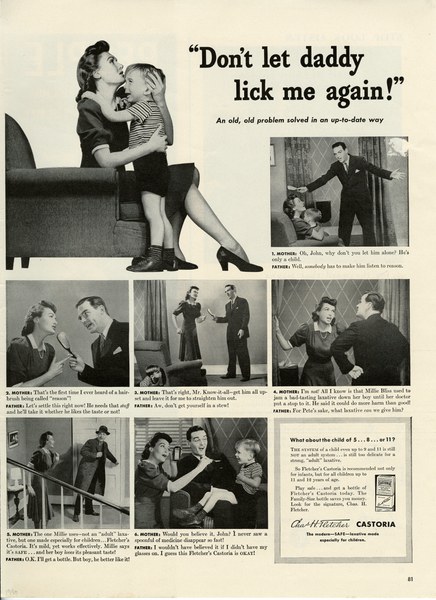
Life Magazine, 1940. Dumbarton Oaks Archives (AR.DP.BL.075).
Recently, at the Georgetown Flea Market, the father-in-law of Director Jan Ziolkowski purchased a new artifact of relevance for the Archives. However, it is allied neither to the Byzantine, nor the garden and landscape, nor the pre-Columbian components of the institution. This new acquisition, in fact, at first glance seems outrageously distant from the Dumbarton Oaks Research Library and Collection: it is a 1940 Life Magazine advertisement (shown above) for Fletcher’s Castoria, a children’s vegetable-based laxative designed to accommodate their “delicate” systems.
In captioned black-and-white images, the advertisement plays out a disturbing domestic drama. A seated mother embraces her son, who cries out: “Don’t let daddy lick me again!” We are immediately assured, however, that the “old, old problem” (of childhood constipation, as it is eventually implied) will be solved “in an up-to-date way”—this drama will have a happy ending, namely with Fletcher’s Castoria.
As the panels unfold, the plot thickens: the son is constipated; Father mandates that the son take an adult-strength laxative for his own good and is prepared to lick him with a hairbrush if he resists. And yet the son does resist, on the grounds that he doesn’t like the taste of the laxative. Mother, disapproving of Father’s actions in the matter, informs him that her friend “Millie Bliss used to jam a bad-tasting laxative down her boy until her doctor put a stop to it. He said it could do more harm than good!” The one Millie Bliss now uses?—Fletcher’s Castoria. Father purchases the Fletcher’s Castoria, and the boy happily takes his spoonful of medicine.
But who is this “Millie Bliss?” Dumbarton Oaks founder Mildred Barnes Bliss had at one time been a major shareholder in the Centaur Company which was best known for manufacturing—you guessed it—Fletcher’s Castoria. Is the use of the name “Millie Bliss,” then, coincidental or purposeful? Mildred Bliss’s father, Demas Barnes, in 1878 had financially backed the Centaur Company, and its success had made him and his family quite wealthy. After his death in 1888, the press routinely referred to Mildred Barnes Bliss as the “Castoria heiress,” and it was widely known that the legacy of this and other investments had allowed the Blisses to fund their passions for collecting and gardening and, eventually, to inaugurate a research institution in Washington, D.C. in 1940, the very year that this ad appeared.
Interestingly, in other versions of this advertisement that appeared in 1940, the name “Millie Bliss” has been changed to “Doris Smith.” Is it possible that Mildred Bliss or someone acting on her behalf requested that Centaur pull her name from the ads?

